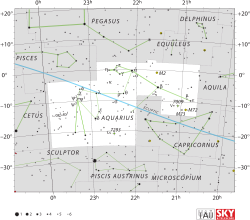| Observation data Epoch J2000.0 Equinox J2000.0 (ICRS) | |
|---|---|
| Constellation | Aquarius |
| Right ascension | 22h 10m 37.48206s [1] |
| Declination | −11° 33′ 53.7754″ [1] |
| Apparent magnitude (V) | +5.43 [2] |
| Characteristics | |
| Spectral type | B5 III [3] |
| B−V color index | −0.12 [4] |
| Astrometry | |
| Radial velocity (Rv) | +1.5 [2] km/s |
| Proper motion (μ) | RA: +29.29 [1] mas/yr Dec.: +8.76 [1] mas/yr |
| Parallax (π) | 7.25±0.33 mas [1] |
| Distance | 450 ± 20 ly (138 ± 6 pc) |
| Absolute magnitude (MV) | −0.26 [5] |
| Details | |
| Radius | 5.6 [6] R☉ |
| Luminosity | 219.16 [5] L☉ |
| Surface gravity (log g) | 4.00 [3] cgs |
| Temperature | 13,860 [3] K |
| Metallicity [Fe/H] | –0.26 [3] dex |
| Rotational velocity (v sin i) | 20 [7] km/s |
| Other designations | |
| 38 Aqr, BD−12°6196, FK5 3771, HD 210424, HIP 109472, HR 8452, SAO 164910 [8] | |
| Database references | |
| SIMBAD | data |
38 Aquarii is a star in the equatorial constellation of Aquarius. 38 Aquarii is its Flamsteed designation; its Bayer designation is e Aquarii. It is a faint star but visible to the naked eye, with an apparent visual magnitude of +5.43. [2] Based on parallax measurements, it is around 450 light-years (140 parsecs ) away; [1] it is 0.28 degree south of the ecliptic.
The spectrum of 38 Aquarii matches a stellar classification of B5 III. [3] A luminosity class of III indicates that this is an evolved giant star. It has 5.6 [6] times the radius of the Sun and is spinning with a projected rotational velocity of 20 km/s. [7] The outer atmosphere of the star has a blue-white glow from an effective temperature of 13,860 K. [3]
